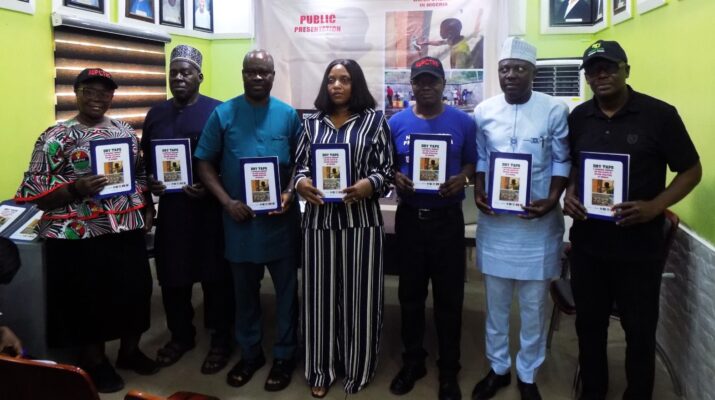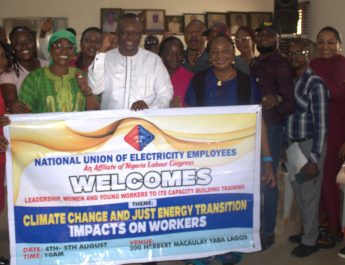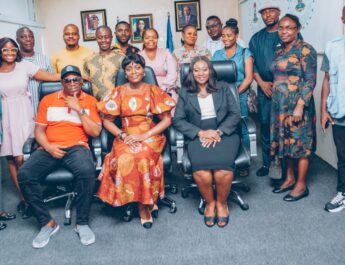Events that heralded this year’s World Water Day may have come and gone, but the lessons cannot be forgotten in a hurry as a coalition of civil society groups have accused government at all levels of gross negligence of public water leading to what they describe as ‘dry taps and severe water crisis’ across Nigeria. Lamenting that graft and governments’ deliberate under-funding of public water infrastructure with a view to privatizing the sector have created ‘enemies for water’, they urged members of the public to reject World Bank and International Monetary Fund’s (IMF) promoted privatization schemes at the federal and state levels, as well as uphold human right to water
By Edu Abade
A coalition of civil society water justice groups in Nigeria have lamented the neglected and dilapidated public water infrastructure across the country, maintaining that the situation, which has caused poor access to potable and affordable water by most Nigerians, is insensitive and unacceptable.
In a report titled: Dry Taps: A Damning Verdict on the State of Water Utilities in Nigeria on the sidelines of this year’s World Water Day (WWD) on Saturday, March 22, 2025, the groups provided detailed solutions to the challenge from the outcomes of fact-finding visits to public water utilities in six states of the federation including Enugu, Edo, Lagos, Oyo, Kogi and Kano.
The visits were conducted by the Renevlyn Development Initiative (RDI), New Life Community Care Initiative (NELCCI), Citizens Free Service Forum (CFSF), the Ecumenical Water Network Africa (EWN-A), Environmental Defenders Network (EDEN), Socio-Economic Research and Development Centre (SERDEC) in collaboration with the Amalgamated Union of Public Corporations Civil Service Technical and Recreational Service Employees (AUPCTRE).
The report uncovered aging and crumbling infrastructure due to lack of maintenance, poor funding for purchase of treatment chemicals, erratic power supply resulting to the use of alternative power sources at huge cost, shortage of manpower and irregular payment of salaries of workers, among other challenges besetting the water utilities.
In the public presentation of the report in Abuja, AUPCTRE General Secretary, Comrade Sikiru Waheed explained that although the scope of the research is limited to six of Nigeria’s 36 states, it deliberately captures the situation in at least one state per geographical zone, making it a sneak peek into the overall picture of access to water situation across the country.
Due to manpower and resource challenges the research focused on the water situation in the cities since the rural communities where 70 percent of Nigerians reside rely on streams, rivers and in a few cases private water vendors and boreholes for their daily domestic water needs.
Executive Director of RDI, Philip Jakpor said: “The investigations we conducted exposed what is already in plain sight. Now we can lay the blame for the parlous state of water in Nigeria on the government at the state and federal levels that continue to appropriate funds for the water sector yet there is nothing to show that the funds are used for what they are meant for. It is a wicked strategy across board to ultimately collapse the water utilities sector and pave way for their privatization.”
Executive Director of EDEN, Barrister Chima Williams said: “What we have found in all the states we visited is that the state governments are only sloganeering on ensuring their citizens have unfettered access to potable water. It is a ruse. How else can one explain their neglect of water utilities that were built with billions of naira? It is shocking and very depressing”
Similarly, Executive Director of CFSF, Comrade Sani Baba cautioned: “If the government continues on this trajectory of neglect of the water utilities then a public health disaster of unimaginable proportions is inevitable. The appetite for privatisation sweeping across the country from Lagos to Kano and the other states is a wind that will ultimately blow no good because it does not concern itself with the situation in the rural communities.”
While presenting findings from their respective states, Coordinator of EWNA, Reverend Kolade Fadahunsi, Executive Director of SERDEC, Tijani Abdulkareem and Executive Director of NELCCI, Florence Ifeanyi-Aneke said the situation in the water utilities was demoralising employees, many of whom are near retirement and there are no plans on ground to replace them.
In Kano, the three waterworks combined only meet the needs of less than 10 percent of the population. The case is similar to Enugu where the previous administration voted billions of naira for expanding the network of the waterworks but nothing on ground to show what the funds were judiciously utilised. Currently, the Enugu Water Corporation has only 11, 234 customers.
At the Eleyele Scheme in Ibadan a disturbing sight in the premises is the number of electricity generators used to pump water due to the erratic power supply. In Edo State the Ikpoba River Dam, which is supposed to feed the waterworks in Ugbowo and Iyaro has been left fallow. Some privately owned fish ponds were also located within the vicinity. The dam which used to produce over 90MGD, was confirmed to be no longer operational as the pumping facility had been abandoned.
Kogi State is also in the red as the Greater Lokoja Waterworks and all other zonal sub-station offices are not producing water and have been locked since the 2022 floods damaged them.
In Lagos, about N760 million was committed to rehabilitation of the 48 mini and micro waterworks in 2017 following findings that there was already a deficit of 500 million gallons per day of water supply in the state. Subsequently, the state government appropriate huge amounts for the sector yearly, but disturbingly, nothing on ground suggests that the funds were judiciously used, as most of the waterworks remain comatose, impaired or at best operate far below their installed capacities. The Adiyan and Iju Waterworks visited in the course of this investigation work sub-optimally.
The groups recommended that the government should urgently address the water crisis including the need for the declaration of a state of emergency on the water sector and the integration of broad public participation in formulating plans to achieve universal access to water.
They urged the federal and state governments to reject all forms of water privatization and commodification and the need for them to fully uphold the human right to water as an obligation of the government, representing the people.
They also demanded a probe of the billions of naira in loans for the countless water schemes across the federation and the strengthening of public accountability in the management of water resources, among others.
MEANWHILE, the Our Water Our Right Africa Coalition (OWORAC) has canvassed urgent action to safeguard Africa’s water resources from what it describes as the twin threats of climate change and water privatisation.
The coalition, which urged African governments to protect water as a public good, cautioned against the growing trend of treating water as a market commodity, while decried attempts to justify water privatisation under the guise of climate adaptation.
Citing this year’s theme: Glacier Preservation, OWORAC highlighted the punishing impacts of climate change on global freshwater reserve, insisting: “But the message must be clear that the global climate crisis is no excuse to hand over our water to corporations just as rising global temperatures, largely driven by reckless extractivism and lack of corporate accountability, are already severely affecting freshwater availability across Africa. As such, allowing profit-driven models to control water supply would only deepen inequality and worsen access for vulnerable populations.
“Africa’s water crisis is already at a tipping point with over 1.3 billion Africans facing water insecurity every day. The glaciers that feed our rivers and sustain life are melting at alarming rates, threatening water security for millions. The melting of glaciers on Mount Kilimanjaro, the Rwenzori Mountains, and Mount Kenya-which feed vital rivers like the Nile, Congo, and others-will exacerbate droughts, food insecurity and water stress for millions across the continent.
“In Africa, where entire communities depend on freshwater sources fed by mountain glaciers and seasonal flows, this crisis will not only intensify water shortages but also worsen social inequality. For those who already struggle to access clean and affordable water, the effects of climate change will be catastrophic-unless urgent action is taken.”
The coalition, which includes the SYNATEEC Trade Union, Cameroon; Centre for Policy and Advocacy, Cameroon; Biodiversity and Biosafety Association, Kenya; Confédération de Syndicats Autonomes du Sénégal; Senegal Water Justice Network, Senegal; Water Citizens Network and Revenue Mobilization Africa, Ghana; Corporate Accountability and Public Participation Africa (CAPPA) and Corporate Accountability, USA drew a direct link between the worsening climate crisis and the growing push for water privatisation, calling them “two sides of the same coin.”
“As glaciers recede and freshwater becomes scarcer, corporations and financial institutions are exploiting this crisis as an opportunity to entrench profit-driven models of water management,” OWORAC said.
“The push for corporate control schemes such as so-called public-private partnerships (PPPs), water concessions, and bulk water purchase agreements across Africa has never been more prominent as African governments systematically cede control of water systems to profit-oriented entities. This has led to escalating water tariffs, reduced public oversight, and water cutoffs for non-payment, denying vulnerable populations access to a basic human right.”
The pro-public water coalition warned that privatisation is not a solution to climate-induced water scarcity, arguing instead for long-term, publicly funded solutions.
“If climate change is shrinking our water sources, then African governments must act decisively to expand and protect public water systems, not privatise them. The argument proffered by privatisation advocates, where they posit that increased private sector investment into the water sector is an appropriate response to climate-induced water scarcity, is flawed.
“We need long-term commitments and action to adapt to climate change and fulfill the human right to water. Yet these urgent needs are simply incompatible with the insatiable pursuit of ever-rising quarterly profits and stock prices that corporations and their shareholders demand. The recklessly short-sighted profit incentives that have driven our planet to the current state of unsustainability must not be allowed to govern our essential public services, especially the provision of safe drinking water.”
The statement cited past failures of water privatisation in countries such as Senegal, Kenya, Ghana, Cameroon, Mozambique, Gabon and Tanzania as evidence that applying market models to essential services is not only ineffective but harmful to marginalised communities.
“Market-driven models do not solve water crises they worsen them and, in many cases, even create new ones.
“The path forward requires massive public investment in water infrastructure to build climate resilience, community-driven water governance models that prioritise local needs over corporate profits and legislative protections to prevent the privatisation of freshwater resources and public water services under the guise of “climate adaptation.”
The coalition urged African governments, regional blocs, and global institutions to reject all forms of water privatisation and instead support state-led, publicly financed water systems that are accessible to all.
“We also call on these institutions to strengthen climate adaptation policies that protect freshwater reserves and ensure sustainable public water management. African governments should also hold multinational corporations accountable for water exploitation and stop financial institutions from imposing privatisation as a pre-condition for water sector financing.
“Glaciers are melting, but our resistance remains unyielding. African governments must act now to invest in strong, climate-resilient public water systems-not sell them off to corporations. We will not allow the climate crisis to become another excuse for corporate capture of our water. Water belongs to the people-not the market,” the groups concluded.




